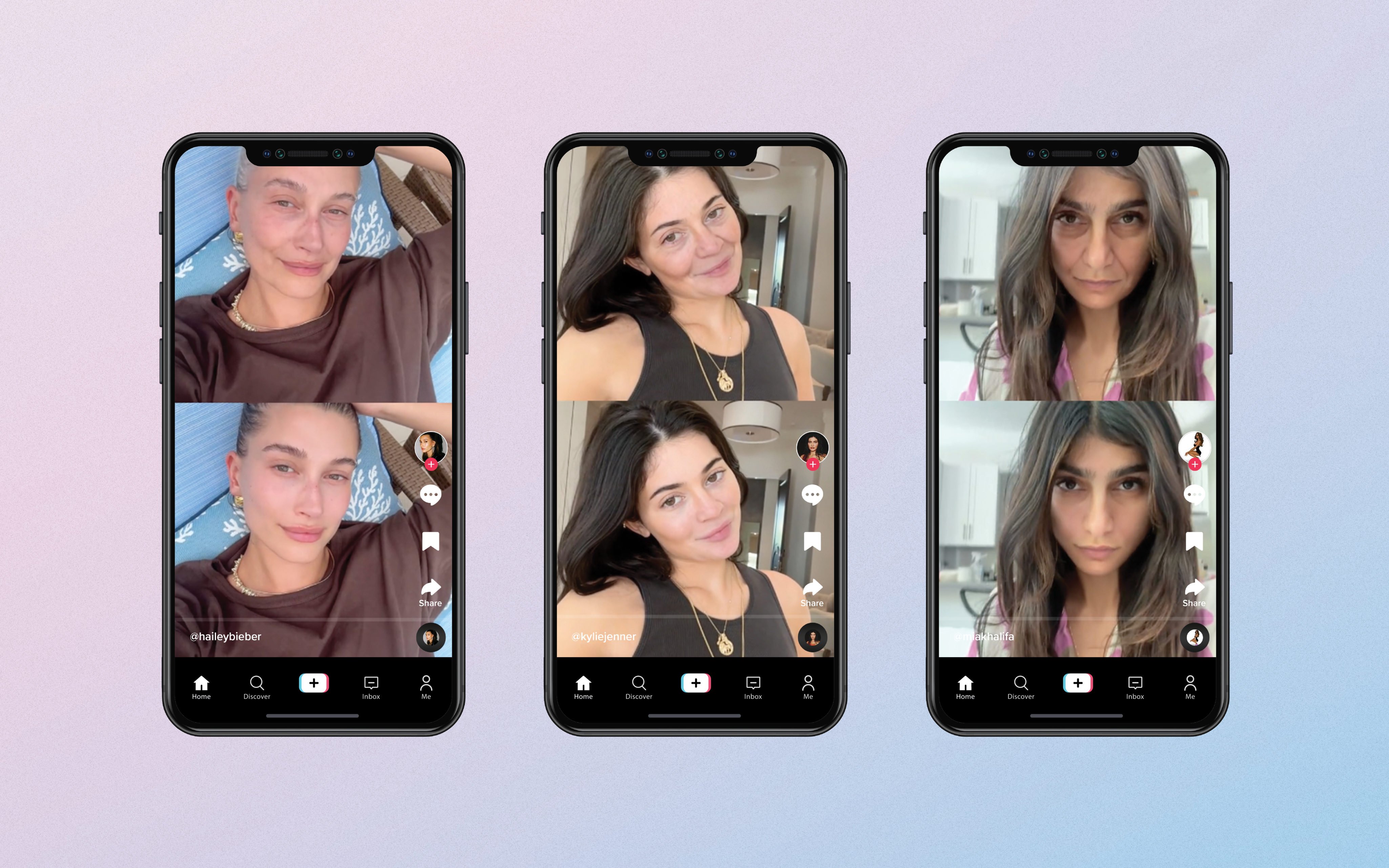A now-viral TikTok filter is inadvertently inspiring a new perspective on growing older.
Picture your face a few decades from now. Maybe you have crow’s feet and pronounced under-eye bags. Your hair might have gone grey. You likely have some dark spots and hyperpigmentation. We’re taught to be scared of that inevitable transformation. But what if we embraced it instead?
RELATED: Are Women Not Allowed to Age?
On TikTok, the “Aging” filter — which has over 10 billion views on the app — uses artificial intelligence to predict what you might look like in the future, showing users with sagged cheeks, thinned lips, fine lines and even yellowed teeth. And over the past week, the effect has become an agent of digital chaos.
At first, the filter set off something of a collective existential crisis. It has inspired panic-induced applications of sunscreen, intensified emphases on skincare regimens, and advice on procedures to “age as gracefully as possible.” It’s even prompted therapists to weigh in with advice on mitigating aging anxiety. This shock factor was most likely intended. Age-related filters reportedly do consistently well on TikTok, and it’s easy to see why.
Earlier this year, the “Teenage Look” filter went viral on the app. Unlike “Aging,” the effect smooths fine lines, softens complexions and shows people a simulated version of their high school selves. But even that trend sparked similar dread, with users pointing out how the filter’s nostalgia made them more aware of their own mortality. Both filters — while seemingly opposites of one another — exemplify our fear-fuelled obsession with marking our age, whether we’re looking back or looking ahead. The impacts reach beyond the internet, as plastic surgeons have reported a rise in patients asking to look like filtered selfies.
No matter what artificially enhanced version of yourself is reflected back at you, TikTok filters are always a bit jarring. So when we engage with them, it’s usually helpful to remember that they’re not real. But the “Aging” filter — which has been dermatologist-approved for its accuracy — presents a new kind of challenge, because it’s not so far-fetched.
Unsurprisingly, the TikTok aging filter has exposed a horror-filled knee-jerk reaction, with users like Kylie Jenner expressing their distaste for a look at their face with considerably less collagen. (She later wrote “she’s cute” in the comments.)
At the same time, a sense of appreciation has emerged. Hailey Bieber and Mia Khalifa noted similarities to their grandmothers. A smiling Amy Poehler got in on the trend with the short but impactful caption reading, “May I be so lucky.” Users are lovingly remarking on how they look like the older women in their lives. There have been makeup tutorials with the filter on. Some have even positioned it as a version of themselves to aspire to, with one user writing, “I can’t wait to meet her.”
Over the past few days, my feed has shifted to people embracing their elderly digital selves. Peppered between posts of fashion micro-trends or videos about the Barbie press tour are visual odes to aging, with the buzzy filter as a prompt. In some ways, the very image of growing old has become its own kind of trend.
More and more, it seems we’re in a time of aging dichotomy, where growing older is embraced at a performative level, but not always a genuine one. Julia Fox can declare that “aging is fully in,” while Kim Kardashian unapologetically says she’d “eat poop” to look young. We praise Martha Stewart for her youthful glow in a swimsuit photoshoot while ridiculing Madonna for her obvious cosmetic procedures. Women over the age of 45 are being increasingly recognized in Hollywood, while the stars of And Just Like That… continue to face endless flack over their appearances.
In 2023, the discourse on anti-aging hasn’t disappeared; it’s just reinvented itself in sneakier ways. Take the idea of ageing gracefully. “What makes ‘aging gracefully’ a particularly nefarious euphemism for anti-aging is that it implies anti-aging should appear to be effortless,” argues beauty writer Jessica DeFino in her newsletter The Unpublishable. “‘Aging gracefully’ is not effortless, though — it demands an incredible amount of effort and then demands even more effort to disappear the evidence of said effort.” The mainstream idea is still that there’s a right way to age. But the virality of the Aging filter, with its emphasis on so-called imperfections, inadvertently challenges that.
If nothing else, it’s offering algorithmic visibility to growing older. (I, for one, have never seen so many celebrities age at once.) Ageist beauty standards are probably not going anywhere anytime soon. But maybe the TikTok aging filter, with its baked-in inevitably of how we’ll look years down the line, can be a start. And even if our acknowledgement of aging is happening through a filter, it feels pretty radical.
